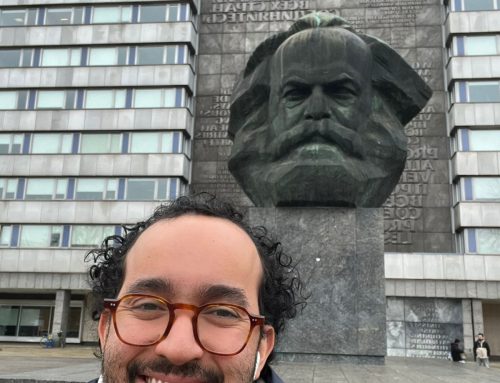On Thursday, January 28th at 4 pm (CET), we hosted CAS SEE Weekly Seminar with Nadia El-Shaarawi and Maple Razsa, presented by our fellow Kevin Kenjar. The seminar is entitled: Ahmed, the Megaphone, and the Assembly of New Political Subjects In 2015.
Ahmed H. was detained following protests by hundreds of refugees against the abrupt closure of the Hungarian-Serbian border at Röszke. Hungarian authorities charged Ahmed with terrorism and eventually sentenced him to eleven years in prison. Central to the prosecution’s allegation that Ahmed led a “migrant invasion” of Hungary were photos of him holding a megaphone amid the tense, and eventually violent, standoff with riot police. Ahmed’s prosecution can be understood within the wider anti-migrant policies of the Orban regime. In response to such far-right state attacks on migration, many liberal critics have insisted, instead, on a humanitarian interpretation, rendering migrants and refugees apolitical victims. In this paper we seek to go beyond this political and analytical bind, which would have us understand people on the move as either victims or enemies, to ask what Röszke teaches us about the politics of movements against borders, in both senses of the phrase. What kind of assembly was this that demanded repeatedly that the state “open the borders?” What collective subject did Ahmed address with the megaphone? What kinds of conceptual tools, or political imagination, is required to recognize this plural political subject, this insurgent mobility, formed en route?
Nadia El-Shaarawi is an Assistant Professor of Global Studies at Colby College. She is a cultural and medical anthropologist who specializes in transnational forced migration, humanitarian intervention, and mental health in the Middle East and North Africa. Her current book project, Collateral Damages, reckons with the lived consequences of the 2003 invasion of Iraq and the violence that followed by analyzing how Iraqi refugees in Egypt negotiated conditions of protracted urban exile and sought to rebuild their lives after war and displacement. In collaboration with Maple Razsa, Nadia is also working on Insurgent Mobilities, a collaborative ethnography of the Balkan Route that refugees travel to reach Europe. In contrast to narratives that present the Route as either a humanitarian or border “crisis”, Insurgent Mobilities explores what’s revealed by viewing the route from the point of view of refugees and solidarity activists as they struggle for freedom of movement. Prior to joining Colby, Nadia was the Global Migration Postdoctoral Fellow at the Kenan Institute for Ethics at Duke University, where her work included research and teaching on the health and social effects of displacement and resettlement.
Maple Razsa is committed to using text, images, and sound to embody the lived experience, as well as the political imaginations of contemporary social movements. Trained as a filmmaker and anthropologist at Harvard University, he is an Associate Professor of Global Studies at Colby College. Maple has conducted fieldwork with alterglobalization protesters, anarchist-punk squatters, migrant-labor organizers, video activists, and, most recently, opponents and transgressors of the European border regime. His films—including The Maribor Uprisings, Occupation: A Film About the Harvard Living Wage Sit-In, and Bastards of Utopia—have shown in festivals around the world, including CPH:DOX, Hot Docs, and DOK Leipzig. The Society for Visual Anthropology named Uprisings the Best Feature Film of 2017. Bastards of Utopia: Living Radical Politics After Socialism (Indiana University Press, 2015), the written companion to the film of the same title, won the William A. Douglass Prize in Europeanist Anthropology. His current research project is Insurgent Mobilities (in collaboration with Nadia El-Shaarawi), an ethnography of refugee and activist struggles to enact freedom of movement in Europe.






